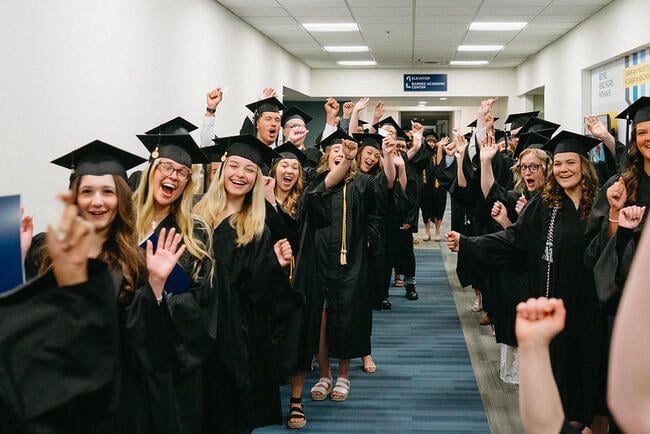You have /5 articles left.
Sign up for a free account or log in.

Bethel University has a 99 percent job or graduate school placement rate for undergraduates. Now eligible students who don’t fall into that group are guaranteed employment or grad school enrollment at Bethel.
Bethel University/Flickr
For some students, enrolling in college can feel like a gamble due to the high cost and lack of a clear career at the end of the program. But a growing number of colleges and universities are guaranteeing students will land a job or graduate program slot within months of graduation.
Bethel University in St. Paul is the latest to make such a promise; Bethel’s Career Commitment provides students in the College of Arts & Sciences with additional assistance if they are still unemployed or not enrolled in graduate school six months after graduation—including by offering a tuition-free spot in a graduate-level Bethel course or a staff job at the university.
The trend indicates a growing awareness among institutions of their responsibility to provide students with career-development opportunities, as well as their recognition that a lack of institutional support can impact the college’s perceived value.
State of play: Nationally, institutions of higher education are struggling to demonstrate value to the public, including prospective students, parents and lawmakers. Much of the trepidation comes from a lack of transparency regarding colleges’ high cost of attendance and the mountain of student loan debt Americans hold, as well as high unemployment and underemployment rates among graduates.
A recent survey by Tyton Partners found that among students who believe college is worth the cost, 95 percent think higher education is preparing them well for jobs and careers.
In general, students give fair ratings to the work campuses are currently doing to prepare them for their professional lives. A 2024 Student Voice survey by Inside Higher Ed and Generation Lab found that the plurality of students rate their institution’s efforts in career development as “average” (34 percent), 44.6 percent combined consider their college “good” or “excellent,” and 18 percent said poor or below average.
Today’s college students are also eyeing a competitive job market during an economic downturn, as well as pressures from evolving technologies, such as generative artificial intelligence, that threaten entry-level roles.
Embedding career development throughout the curriculum or as a graduation requirement is becoming more common, encouraging students to think about life after college earlier and in more meaningful ways so they aren’t caught unprepared when senior spring rolls around.
Previous research shows that students engaged in career development are more likely to secure a job; a 2022 survey by the National Association of Colleges and Employers found that students who engaged with their career center received more job offers than their peers who didn’t. But some structural barriers can hinder students’ ability to participate in career activities, including off-campus work, caregiving responsibilities or lack of awareness of services. Internships are also increasingly competitive, leaving some students behind.
How it works: A key piece of the Bethel Career Commitment is that students must undertake significant measures to advance their own career before the university will open additional doors of support.
Students must complete four “phases” of career preparation prior to graduation to be eligible for a spot in Bethel’s career commitment plan. The elements include creating a Handshake profile, meeting with a career-development coach and participating in an internship. And after they earn their degree, students must meet with a career coach monthly and apply for at least 20 jobs per month to complete the final phase.
In addition, students must have a minimum 3.0 GPA, be in good financial standing with the university and be willing to relocate.
For students who don’t meet all the eligibility requirements, the university provides postgraduation career support in the form of coaching, Bethel University president Ross Allen told Inside Higher Ed.
“Today, 99 percent of Bethel graduates are employed or in graduate school within a year, so we expect a small number of graduates will need the additional postgraduation support,” Allen said.
He anticipates that graduate-level credits will often be “the most helpful next step vocationally,” but the university may offer short-term employment opportunities to students based on staffing needs, Allen said.
A national picture: Other institutions, including Thomas College in Maine, Davenport University in Michigan, Curry College in Massachusetts and the University of Tulsa, guarantee their graduates employment, also on the condition that students participate in career development while enrolled.
At Davenport, for example, students in select majors who earn a 3.0 GPA, complete an internship or experiential learning opportunity, and participate in extracurricular activities are supported by the DU Employment Guarantee. The plan allows students to enroll in 48 additional credits tuition-free in a graduate, undergraduate or professional program at the university, as well as participate in career coaching and recruitment efforts.
At Curry College, students who opt into the Curry Commitment receive assistance with federal student loans for up to 12 months. They are also given a paid internship or a tuition waiver for six credits of graduate studies at the institution. To be eligible, a student must participate in career advising, workshops and résumé development; earn at least a 2.8 GPA; and graduate within four years.
None of these institutions differentiates among the types of job a student may secure—making no distinction between a part-time role or one that doesn’t require a bachelor’s degree—leaving some questions about the underemployment of college graduates.
If your student success program has a unique feature or twist, we’d like to know about it. Click here to submit.


